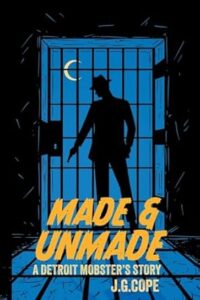Today, we’re talking with J G Cope about his book, Made & Unmade
 Tell us something unexpected about yourself!
Tell us something unexpected about yourself!
I can make an arrowhead from a rock. This is an insight into my psyche. I’ve always had an interest in history and anthropology. Twenty years ago a neighbor showed me an “arrowhead” he had found. The question got stuck in my head, “How’d they do that?” It became an obsession to learn how.
Why do you write?
Strictly for my own entertainment, as a hobby. Whether or not my writing is good enough for a wider audience can only be answered one way: by tossing it out there and seeing what happens. So, here we go…
Where did you get the inspiration for your current book?
To a large extent it’s a story (in bits and pieces) that has been floating around in my head for over thirty years. I’m not sure why I decided to write it down.
What do you enjoy the most about your genre?
It allows for vast freedom and brutal honesty, like a no-holds-barred barroom brawl.
How would you describe your writing process?
It starts with what I call a “seed,” which can be anything, but for me is usually a question, “What would happen if…?” I try to ignore it; writing a novel is a long and taxing endeavor! If the idea keeps coming back to me, it eventually sprouts. That’s when I know I’m in trouble. From there, it hits what I call “the weed patch stage,” snippets of characters, dialogue, and scenes start filling my head. At that point, I’m stuck, the only way to control the process is to write it down. From there a novel forms from two processes, what I call “thinking about writing” and “actual writing.” Thinking about writing happens from outside of the story. It is the brainstorming and setting of the organizational structure of the story (managing the weed patch). Actual writing happens from inside the story. It is when I get to go inside the scenes and actually experience them, then try to write them down so the reader can also experience them. This is the fun part, where all kinds of unexpected things can happen.
What do you think authors have to gain from participating in social media?
More than anything else, exposure. Somewhere out there in the world is some group of people interested in reading just about anything one can think of to write about. Social media can cast the wide net to find them.
 What advice would you have for other writers?
What advice would you have for other writers?
Being brand new at this, I have no valid advice to give. For me, personally, the advice I give myself: do it your own way. Don’t try to copy anyone else. Find your own voice. Tell the story you want to tell, how you want to tell it, then toss it out there and find out if it’s any good.
How do you select your books’ titles and covers?
With an incredible amount of help and guidance from the fine professionals at Alkira Publishing.
What’s your next step?
I have already written quite a few other manuscripts. Using what I learn from going through this first (and very scary) publishing process, I hope to let at least a few of my other stories see the light of day. Regardless, it’s a hobby for me, so I’m always working on writing something.
How do you react to seeing a new review for your book?
At the basic, emotional level, with anxiety. In the logical, human being sense, as an opportunity to learn. It makes no difference what I, as an author, am trying to say or how I perceive the story. All that matters is what the reader sees and how they feel about it.


